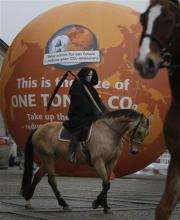Developing countries end boycott at climate talks

(AP) -- Poor countries ended a boycott of U.N. climate talks Monday after getting assurances that rich nations were not conspiring to soften their commitments to cutting greenhouse gases, European officials said.
European Union environment spokesman Andreas Carlgren said informal talks resolved the impasse, which was started by African countries and backed by major developing countries, including China and India.
Rich and poor countries "found a reasonable solution," he said.
Developing countries agreed to return to all working groups that they abandoned earlier in the day at the 192-nation conference, said Anders Frandsen, a spokesman for conference president Connie Hedegaard.
The boycott had disrupted efforts to forge a pact on global warming and forced the cancellation of formal working groups, delaying the frantic work of negotiators trying to resolve technical issues before the arrival of more than 110 world leaders, including President Barack Obama, later this week.
The move was largely seen as a ploy to shift the agenda to the responsibilities of the industrial countries and make emissions reductions the first item for discussion Tuesday.
"We are really prepared to discuss all issues in the negotiations. It means also absolutely all issues under the Kyoto Protocol," Carlgren said.
The developing countries want to extend the 1997 Kyoto Protocol, which imposed penalties on rich nations if they did not comply with its strict emissions limits but made no such binding demands on developing nations.
Poor countries, supported by China, said Hedegaard had raised suspicion that the conference was likely to kill the Kyoto Protocol. The United States withdrew from Kyoto over concerns that it would harm the U.S. economy and that China, India and other major greenhouse gas emitters were not required to take action. China is now the world's largest greenhouse gas polluter.
It was the second time the Africans have disrupted the climate talks. At the last round of negotiations in November, the African bloc forced a one-day suspension until wealthy countries agreed to spell out what steps they will take to reduce emissions.
"They are trying to put the pressure on" before Obama and other world leaders arrive, said Gustavo Silva-Chavez, a climate change specialist with the Environmental Defense Fund. "They want to make sure that developed countries are not left off the hook."
An African delegate said developing countries decided to block the negotiations at a meeting hours before the conference was to resume. He said applause broke out every time China, India or another country supported the proposal to stall the talks.
Jake Schmidt of the Natural Resources Defense Fund said "this is all part of the negotiating dynamic, especially as you get closer to the end game."
U.N. climate chief Yvo de Boer said Hedegaard was holding informal consultations with delegates "to get things going."
Canada's Environment Minister Jim Prentice said the dispute set back negotiations.
"We have lost some time. There is no doubt about that," Prentice said. "It is not particularly helpful, but all in all it is our responsibility to get on with it and continue to negotiate."
In Washington, the White House announced a new program drawing funds from international partners to spend $350 million over five years to give developing nations clean energy technology to curb greenhouse gas emissions and reduce global warming.
The program will distribute solar power alternatives for homes, including sun-powered lanterns, supply cleaner equipment and appliances and work to develop renewable energy systems in the world's poorer nations.
The U.S. share of the program will amount to $85 million, with the rest coming from Australia, Britain, the Netherlands, Norway and Switzerland, Energy Secretary Steven Chu said in Copenhagen.
Former U.S. Vice President Al Gore told the conference the Arctic polar ice cap may disappear in the summer just a few years from now.
Some computer models suggest "that there is a 75 percent chance that the entire north polar ice cap during some of the summer months will be completely ice-free within the next five to seven years," Gore said.
Gore, who won a Nobel Peace Prize for his work on climate change, joined the foreign ministers of Norway and Denmark in presenting two new reports on melting Arctic ice.
British Prime Minister Gordon Brown's office said he would go to Copenhagen on Tuesday - two days earlier than planned - to try to inject momentum into the talks. His spokesman denied that Brown - facing a national election by June - was seeking any personal credit if a deal is struck.
Earlier Monday, British Climate Change Secretary Ed Miliband said countries needed to offer more than fast-start financing for developing nations, noting that the British have called for a yearly fund of $100 billion by 2020.
The financing is intended to help poorer nations build coastal protection from rising seas, modify or shift crops threatened by drought, build water supplies and irrigation systems, preserve forests, improve health care to deal with diseases spread by warming, and move from fossil fuel to low-carbon energy systems.
At the conference center, throngs of newly arrived delegates, journalists and climate activists jammed the security and accreditation lines, forcing police to shut down the nearby subway stop.
In downtown Copenhagen, police said they detained about 20 people among 3,000 climate activists protesting outside Parliament.
More than 1,200 others were detained in weekend protests, although almost all were released after questioning. About a dozen were arraigned on preliminary charges of assaulting police officers or carrying sharp objects.
There were also sporadic reports of vandalism across the city overnight Monday.
Police spokesman Henrik Moeller Jakobsen said 12 cars had been set on fire, including three vehicles belonging to Danish power company Dong Energy. Vandals also smashed windows and threw red paint at the headquarters of the Danish Immigration Service. It was not immediately clear whether those attacks were related to the conference.
©2009 The Associated Press. All rights reserved. This material may not be published, broadcast, rewritten or redistributed.

















